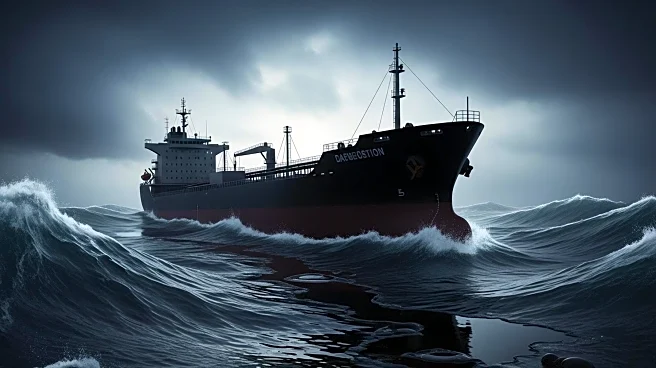What's Happening?
Russia's 'shadow fleet' tankers have been accused of dumping oily waste into the ocean, according to satellite imagery reviewed by Politico. This practice violates the MARPOL convention, which aims to prevent pollution from ships. The dumping is reportedly used as a cost-saving measure, avoiding the need for onboard oily-water separators or expensive in-port wastewater treatment services. The Outlaw Ocean Project claims that this form of pollution exceeds the combined volume of the Exxon Valdez and Deepwater Horizon spills every three years. Satellite imaging from SkyTruth has identified at least five Russian-linked tankers leaving oil slicks as they travel towards European waters. These actions pose significant environmental risks, with potential irreversible damage to coastal states that bear the cleanup costs.
Why It's Important?
The environmental impact of oily waste dumping by Russia's shadow fleet is substantial, threatening marine ecosystems and coastal communities. The practice not only violates international maritime pollution laws but also imposes financial burdens on affected regions due to cleanup efforts. The lack of regulatory oversight and the use of low-reputation registries for these vessels increase the risk of major accidents, which could lead to catastrophic spills. Additionally, the involvement of these tankers in disruptive activities, such as damaging subsea cables, highlights broader security concerns. The situation underscores the need for stricter enforcement of maritime regulations and international cooperation to address these environmental and security threats.
What's Next?
The ongoing scrutiny of Russia's shadow fleet may lead to increased pressure on international bodies to enforce maritime pollution laws more rigorously. Coastal states affected by the pollution might seek compensation or stronger regulatory measures to prevent future incidents. The environmental community is likely to advocate for more comprehensive monitoring and reporting of tanker activities to mitigate the risks posed by these vessels. Additionally, the geopolitical implications of these actions could prompt diplomatic discussions aimed at resolving the underlying issues and preventing further environmental damage.
Beyond the Headlines
The dumping of oily waste by Russia's shadow fleet raises ethical questions about the responsibility of nations and corporations in protecting the environment. The lack of accountability and transparency in the operations of these tankers highlights the challenges in enforcing international maritime laws. The situation may prompt a reevaluation of global shipping practices and the need for more sustainable solutions to prevent pollution. Furthermore, the involvement of these vessels in hybrid warfare activities suggests a complex interplay between environmental and security concerns, necessitating a holistic approach to address these multifaceted issues.











